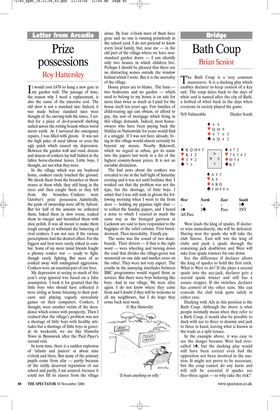Prize possessions
Roy Hattersley
It would cost £470 to hang a new gate in my garden wall. The passage of time, the reason why I need a replacement, is also the cause of the excessive cost. The old door is not a standard size. Indeed, it was made before standard sizes were thought of. So, moving with the times, I settled for a piece of do-it-yourself shelving nailed across the rotting boards where wood meets earth. As I surveyed the emergency repairs, I was filled with gloom. It was not the high price of rural labour or even the ugly patch which caused my depression. Between the garden wall and road, dozens and dozens of conkers lay half hidden in the fallen horse-chestnut leaves. Little boys, I thought, are not what they were.
In the village which was my boyhood home, conkers rarely touched the ground. We shook them from the branches or threw stones at them while they still hung in the trees and then caught them as they fell from the branches. Conkers were October’s prize possession. Admittedly, the pride of ownership wore off by Advent. But for half of the autumn we collected them, baked them in slow ovens, soaked them in vinegar and burnished them with shoe polish. It was all meant to make them tough enough to withstand the battering of rival conkers. I am not sure if the various prescriptions had the desired effect. For the biggest and best were rarely risked in combat. Some of my more timid friends fought a phoney conker war — ready to fight, though rarely fighting. But most of us conked away with undisguised aggression. Conkers were an essential part of our lives.
My depression at seeing so much of this year’s crop ignored was based on a false assumption. I took it for granted that the little boys who should have collected it were sitting at home listening to their podcasts and playing vaguely surrealistic games on their computers. Conkers, I thought, were another victim of the decadence which comes with prosperity. Then I realised that the village’s problem was not a shortage of little boys with healthy attitudes but a shortage of little boys in general. At weekends, we are like Hamelin Town in Brunswick after the Pied Piper’s second visit.
In term time, there is a sudden explosion of ‘infants and juniors’ at about nine o’clock and three. But many of the primary pupils come from afar — partly because of the richly deserved reputation of our school and partly, I am assured, because it could not fill its classes from the village alone. By four o’clock most of them have gone and no one is running pointlessly in the school yard. I do not pretend to know every local family, but, near me — in the old part of the village where we have nonstandard garden doors — I can identify only two houses in which children live. Perhaps I should be pleased that there are no distracting noises outside the window behind which I write. But it is the mortality of the village.
House prices are to blame. The barn two bedrooms and no garden — which used to belong to my house is on sale for more than twice as much as I paid for the house itself ten years ago. Few families of child-rearing age can obtain, or afford to pay, the sort of mortgage which living in this village demands. Indeed, most houseowners who have been paying back the Halifax or Nationwide for years would find it a struggle. If I was not here already, living in this village would almost certainly be beyond my means. Nearby Bakewell, which we regard as urban, got its name into the papers last week in a list of the highest country-house prices. It is not an enviable distinction.
The bad news about the conkers was revealed to me in the half-light of Saturday evening and it was not until bedtime that I worked out that the problem was not the type, but the shortage, of little boys. I admit that I was still sunk in gloom the following morning when I went to the front door — holding my pyjamas tight shut to collect the Sunday papers, and I heard a noise to which I reacted in much the same way as the besieged garrison at Lucknow are said to have responded to the bagpipes of the relief column. First bewilderment. Then incredulity. Finally joy.
The noise was the sound of two skateboards. Their drivers — if that is the right word — were wheeling and turning down the road that divides the village-green war memorial on one side and market cross on the other. They were not very expert. The youths in the annoying interludes between BBC programmes would regard them as novices. But there were boys behaving like boys. And in our village. We were alive again. I do not know where they came from and I doubt if they will be welcome to all my neighbours, but I do hope they come back next week.


































































































 Previous page
Previous page